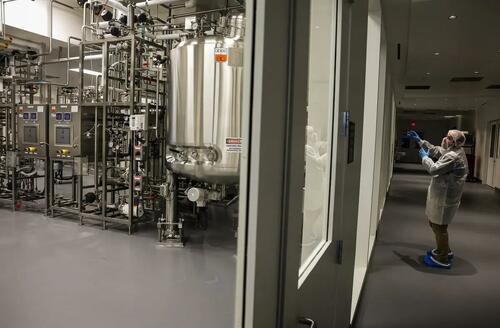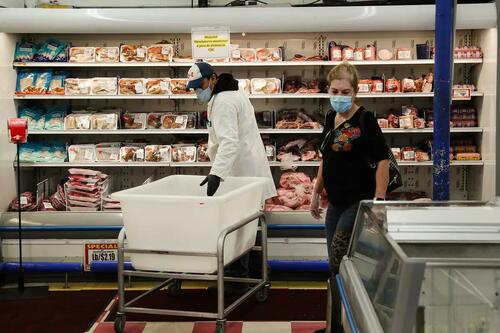price target reduced from USD 215 to USD
https://www.marketscreener.com/quote/stock/DANAHER-CORPORATION-12295/
price target reduced from USD 215 to USD
https://www.marketscreener.com/quote/stock/DANAHER-CORPORATION-12295/
by Patricia Tolson via The Epoch Times (emphasis ours),
In an effort to protect its farming industry, its economy, and the health of its citizens, Italy recently became the first country to officially ban cultivated meat.
Cultivated meat, also known as lab-grown meat, is created in a lab through a five-step process in which stem cells from an animal are replicated and grown in a series of bioreactors before being blended with additives to create a more realistic texture. The meat cells are then drained in a centrifuge, formed, and packaged for distribution, according to consulting firm McKinsey & Company.
In a Nov. 16 Facebook post, Italian Minister of Agriculture Francesco Lollobrigida said, “In defense of health, of the Italian production system, of thousands of jobs, of our culture and tradition, with the law approved today, Italy is the first nation in the world to be safe from the social and economic risks of synthetic food," according to an English translation.
The bill passed the Italian Senate by a measure of 159–53 and was supported by the country's agricultural groups, which worked to protect Italy's $10.1 billion meat-processing industry.

Efforts in the United States to block lab-grown meat, or to ensure that consumers know what they're buying, include a 2018 law in Missouri that prohibits plant-based and lab-grown food from being labeled as “meat.”
"This act also prohibits misrepresenting a product as meat that is not derived from harvested production livestock or poultry," the law states.
On Nov. 13, Florida state Rep. Tyler Sirois filed a bill that aims to prohibit the "manufacturing, sale, holding, or distribution of cultivated meat" in the state.
"Farming and cattle are incredibly important industries to Florida," the Republican legislator told Politico. "So I think this is a very relevant discussion for our state to have."
Should the bill, HB 435, become law, restaurants and stores in violation could be fined up to $5,000, and manufacturers, processors, packers, or distributors who misrepresent or mislabel the food could be fined up to $10,000 per violation.
Wilton Simpson, commissioner of the Florida Department of Agriculture and Consumer Services, is fully on board with Mr. Sirois's effort.
"Without this legislation, untested, potentially unsafe, and nearly unregulated laboratory-produced meat could be made available in Florida," Mr. Simpson said in a statement to The Epoch Times.
"One of my top responsibilities is ensuring the safety and wholesomeness of our food supply and protecting Florida’s consumers, and this proposal does just that.”
On Nov. 22, the measure moved to the Agriculture, Conservation, and Resiliency Subcommittee.

So far, only two countries—the United States and Singapore—have approved cultivated meat for human consumption.
Research and Markets predicts that the global lab-grown meat market will reach nearly $2 billion by 2035. It lists 16 cultivated meat companies, five of which are based in the United States, three in Israel, two in the Netherlands, two in Singapore, and one each in China, India, the UK, and Switzerland.
"In 2025, the nuggets segment is expected to account for the largest share of the lab-grown meat market," Research and Markets states in its January analysis.
"The large market share of this segment is attributed to the increasing adoption of on-the-go lifestyles, the growing demand for snacking products, and the increasing demand for frozen products."
However, lab-grown burger patties are projected to register the highest compound annual growth rate from 2025 through 2035, according to the company.

In November 2022, the Food and Drug Administration (FDA) announced that it had "completed its first pre-market consultation for a human food made from cultured animal cells."
On June 21, the U.S. Department of Agriculture (USDA) granted its first-ever approval to produce cell-cultured meat to two companies in the United States, Good Meat and Upside Food.
Good Meat—the cultivated meat brand of the food technology company Eat Just, Inc.—has manufacturing facilities in the United States and Singapore.
According to the company, the USDA approval allows for its first lab-grown chicken product to be produced and sold in the United States. Four months earlier, the company had received its "No Questions" letter from the FDA, which meant it passed a food safety review.
"Our first product is cultivated chicken that is prepared and served in multiple formats and was approved for sale in Singapore in 2020 and the United States in 2023," the company states on its website.
"We’re also working on other types of meat, including cultivated beef using cells from California pasture-raised cattle and Wagyu from the Toriyama farm in Japan."
Washington-based restaurant China Chilcano added a dish using Good Meat cultivated chicken to its menu in July.
Major investors in Good Meat are UBS O'Connor, a hedge fund management firm within UBS Asset Management, and the venture capital firms of Graphene Ventures and Singapore-based K3 Ventures.
Bill Gates has been a major investor in Upside Foods since its launch in 2017.

Upside Foods said its USDA approval clears the company to produce and sell its cultivated chicken. The company says it takes about three weeks to produce its chicken filet product.
"Not to get bogged down in semantics, but we can’t overstate this: We’re making meat!" the company states on its website.
"Cultivated meat is a brand-new product category, so we understand that there’s a lot of confusion out there about what it is and what it isn’t. For one thing, cultivated meat is not vegan or vegetarian."
According to the company, its cell-cultivated chicken is made up of "more than 99 percent chicken cells."
The FDA approved Upside Foods to make its products in November 2022, based on a self-assessment by Upside of its processes and risk management practices.
https://www.zerohedge.com/commodities/fda-approved-controversial-lab-grown-meat-becomes-reality
On the same day as House Republicans formalize the impeachment inquiry of President Joe Biden, the special counsel investigating Hunter Biden charged the president’s son late Thursday on nine counts stemming from his failure to pay his federal taxes on time on millions in income from foreign businesses.
A grand jury in the Central District of California (yes California!) charged Mr. Biden with three counts each of evasion of a tax assessment, failure to file and pay taxes, and filing a false or fraudulent tax return, according to the 56-page indictment (see below).
The situation is more serious now as the charges include three felony tax offenses and six misdemeanors.
“At times relevant to this Indictment, the Defendant served on the board of a Ukrainian industrial conglomerate and a Chinese private equity fund. He negotiated and executed contracts and agreements for business and legal services that paid millions of dollars of compensation to him and/or his domestic corporations, Owasco, PC and Owasco, LLC,” the indictment reads.
“The Defendant engaged in a four-year scheme to not pay at least $1.4 million in self-assessed federal taxes he owed for tax years 2016 through 2019, from in or about January 2017 through in or about October 15, 2020, and to evade the assessment of taxes for tax year 2018 when he filed false returns in or about February 2020,” the indictment adds.
This is the second indictment against him this year - the first of which related to alleged gun possession and false statements.
He has pleaded not guilty in the gun charges case.
As a reminder, the previous indictment culminated in a plea deal, which ultimately fell apart amid whistleblower allegations that Biden-appointed officials had worked to stifle the case.
Don Jr offered his perspective on the matter...
The case was assigned to Judge Mark Scarsi, who was appointed by former President Donald Trump.
Well, all those 87,000 new IRS agents was money well-spent right?
Instead of going after the 'billionaires', they are clearly just trying to keep the poor-but-talented painters of America down.
Thanks Joe!
....and that's how Gavin Newsom becomes the Democratic Party nominee.
* * *
Read the full docket below:
by Joseph Lord via The Epoch Times (emphasis ours),
The House of Representatives on Dec. 6 voted to pass a bill that will block a proposed rule by the Environmental Protection Agency (EPA) to effectively mandate that most cars produced in the United States be fully electric by 2032.
The bill, H.R. 4468, dubbed the Choice in Automobile Retail Sales Act of 2023, passed the House by a 221–197 vote. That included total GOP support; Democrats, meanwhile, sought to have the bill sent back to committee.
The bill would block an EPA rule that would require roughly 68 percent of cars manufactured in the United States be fully electric by 2032. The rule has won the support of President Joe Biden's administration.
Republicans have rallied against the proposed standards, which they say are unrealistic and threaten to undermine consumer freedom—as well as to increase U.S. dependence on China.
Around 90 percent of the rare earth minerals used to create electric vehicles (EVs) are sourced from the top U.S. adversary.
The broad support among Republicans for blocking the rule was on full display in November, when over 200 House and Senate Republicans signed onto a letter to House Speaker Mike Johnson (R-La.) and Senate Minority Leader Mitch McConnell (R-Ky.) urging opposition to the rule (pdf).
"While we are supportive of the free market producing electric vehicles to satisfy a market need, this misguided EPA mandate would have an immediate, detrimental impact on the choices and affordability of cars, trucks, and SUVs available to our constituents," the Republican signatories said. "It also increases America’s dependence on China."
Specifically, those who signed the letter pushed for the inclusion of a reversal of the EV standards to be included in the final draft of 2024 government funding.
"Not only would the EPA’s proposed regulation hurt America’s national security, but it would severely limit consumer choice for affordable vehicles that fit the needs of the average American," they wrote. "At a time of inflation, high interest rates, and rising costs, the last thing Americans need is to find both new and used vehicles unaffordable because of an EPA mandate."
The National Automobile Dealers Association has also criticized the EPA rule, which they called "too far, too fast."
In a Dec. 5 press conference the bill's sponsor, Rep. Tim Walberg (R-Mich.) and other House Republicans spoke in support of the measure to overturn the rule prior to its vote on the floor.
“This standard … is unattainable, it’s unaffordable, and in fact it’s unrealistic,” Mr. Walberg said.
Rep. Lisa McClain (R-Mich.) agreed, saying that the notion that most vehicles should be fully electric by 2032 is "ridiculous."
She said, "If we force automakers to do this, they will bleed money, which will mean layoffs for employees of families who are already struggling under this administration, and manufacturing will move outside of the United States.
"That is not good for our taxpayers."
Rep. Chip Roy (R-Texas), another enthusiastic supporter of the proposal, raised a series of concerns about the potential effects of a mandate.
Specifically, he pointed to the instability of the U.S. electric grid, which is currently unable to support a large-scale move toward EVs.
As proof of this, he pointed to a case in California a few years ago when Gov. Gavin Newsom asked Californians not to charge their EVs between 4 p.m. and 8 p.m. due to strains on the electric grid.
"What do you do when you're stuck? What do you do when your wife is pregnant in the hospital?" Mr. Roy said. "These questions are existential threats to the well being of American families."
Despite its passage by the House, the legislation seems unlikely to pass muster in the Senate, where Democrats hold the majority.
And even if it did pass the Senate, President Biden has promised to veto the bill.
The White House has defended the rule, saying it's "projected to save Americans $12,000 over the lifetime of a new light-duty vehicle by accelerating adoption of technologies that reduce fuel and maintenance costs alongside pollution."
However, Republicans are unusually united behind the effort to overturn the rule, and this issue could become a key point of negotiations over spending next year.
https://www.zerohedge.com/markets/house-votes-overturn-bidens-ev-mandate
by Megan Redshaw via The Epoch Times (emphasis ours),
New legislation in Illinois would allow individuals receiving blood donations to know whether they’re receiving blood from an individual vaccinated with a COVID-19 vaccine or another messenger RNA (mRNA) vaccine.
Bill HB4243, introduced on Nov. 29 by Illinois state Rep. Jed Davis, amends the Illinois Clinical Laboratory and Blood Bank Act and would require blood banks to test donated blood for evidence of COVID-19 vaccines and other mRNA components, including lipid nanoparticles and spike protein—and requires a blood donor to disclose during each donor screening process whether they have received a COVID-19 vaccine or any other mRNA vaccine during their lifetime.
Additionally, the bill imposes labeling requirements for blood or blood components that test positive for evidence of a COVID-19 vaccine or other mRNA vaccine component or were obtained from a donor who received a COVID-19 vaccine or other mRNA vaccine.
“A constituent approached me concerned about her son's upcoming surgery. What if he needed a blood transfusion with the long-term impacts concerning mRNA vaccines unknown? As a parent myself, her concern and corresponding question feel warranted,” Mr. Davis told The Epoch Times in an email.
“This conversation was the catalyst for my bill delineating blood donations and mRNA vaccines. We disclose medical information all the time with providers, so why not our vaccine history? It's an easy ask, and I'm proud to sponsor this bill.”
Once a bill is introduced in Illinois, it is read and referred to the Rules Committee and will then be assigned to a substantive committee. For elected officials like Mr. Davis, he believes that part of his job is to translate the concerns or ideas of constituents into legislation when applicable—and that every bill, including HB4243, originated from someone walking through his office door. “Without hesitation, helping people is such a blessing and honor,” he said.
Concerned about blood transfusions from people vaccinated against COVID-19, a Republican lawmaker in Montana introduced a bill earlier this year that would have made it a misdemeanor offense for anyone who received a COVID-19 vaccine to donate tissue or blood. However, the bill was tabled quickly in a 19 to 1 vote.
Unlike the bill introduced in Montana, HB4243 does not criminalize individuals who donate blood if they’ve received a COVID-19 vaccine. It merely allows people receiving blood products to know whether the blood they’re receiving came from a vaccinated individual and requires blood blanks to add this information to product labels so that patients can make informed decisions.
According to the Red Cross, there is no waiting period for those who received a COVID-19 vaccine—as long as they are symptom-free and feel well at the time of donation. If an individual doesn’t know which vaccine they received, they must wait two weeks to donate blood.
The Association for the Advancement of Blood & Biotherapies, America’s Blood Centers, and the American Red Cross do not believe COVID-19 vaccines pose a risk to patients receiving blood transfusions.
In a joint statement issued on Jan. 26, the three organizations said there is no “scientific evidence that demonstrates adverse outcomes from the transfusions of blood products collected from vaccinated donors and, therefore, no medical reason to distinguish or separate blood donations from individuals who have received a COVID-19 vaccination.”
The statement further reads that the U.S. Food and Drug Administration (FDA), on multiple occasions, has confirmed that there is no evidence to support concerns about the safety of blood donated by vaccinated individuals. However, the FDA has not provided data showing it is safe to receive blood donated from vaccinated individuals, and many studies have found mRNA from COVID-19 vaccines circulating in the blood or plasma of recently vaccinated individuals.
A 2022 study published in Biomedicines found synthetic mRNA in Pfizer’s COVID-19 vaccine persists in the blood of vaccinated individuals for at least two weeks post-vaccination.
A January study published in the Journal of Pathology, Microbiology, and Immunology found full-length or traces of SARS-CoV-2 spike mRNA vaccine sequences from both Pfizer and Moderna in the blood of some vaccinated individuals up to 28 days after COVID-19 vaccination.
“We expect that vaccine mRNA detected in plasma is contained within LNPs [lipid nanoparticles] and that the LNPs in plasma have been slowly released from the injection site either directly to the blood or through the lymph system,” the authors wrote.
In a January study in Circulation, researchers found persistently elevated circulating levels of full-length spike protein in the blood of adolescents and young adults who developed myocarditis following COVID-19 vaccination.
A 2022 study in Clinical Infectious Diseases found circulating S1 antigens from the SARS-CoV-2 spike protein in the plasma of participants vaccinated with Moderna’s COVID-19 vaccine. Antigens are the weakened or inactive parts of a particular organism—in this case, the spike protein—that triggers an immune response within the body. Researchers also confirmed that the detected S1 antigens resulted from vaccination and not natural infection.
Opdivo (nivolumab) plus Yervoy (ipilimumab) demonstrates statistically significant and clinically meaningful improvement in progression-free survival compared to investigator’s choice of chemotherapy
Combination of Opdivo plus Yervoy is the only dual immunotherapy regimen to demonstrate significant efficacy benefit compared to chemotherapy as first line treatment in MSI-H/dMMR metastatic colorectal cancer
https://www.biospace.com/article/releases/bristol-myers-squibb-announces-phase-3-checkmate-8hw-trial-evaluating-opdivo-nivolumab-plus-yervoy-ipilimumab-/